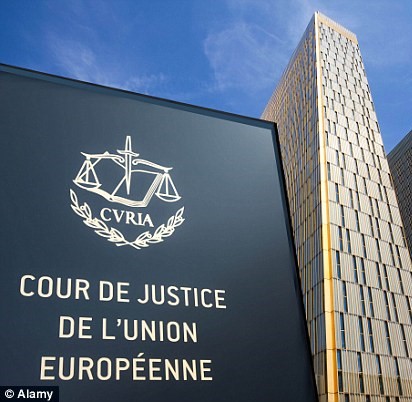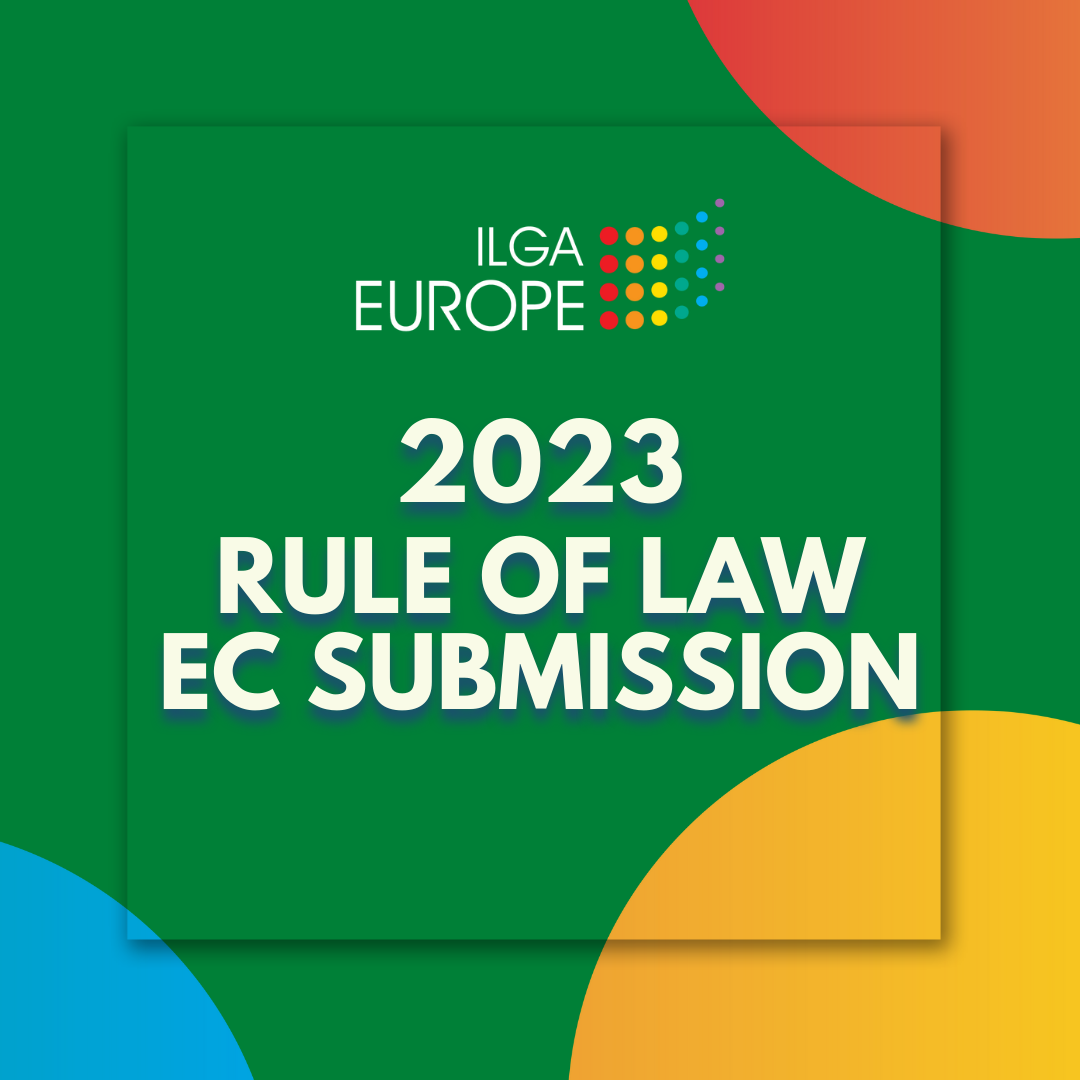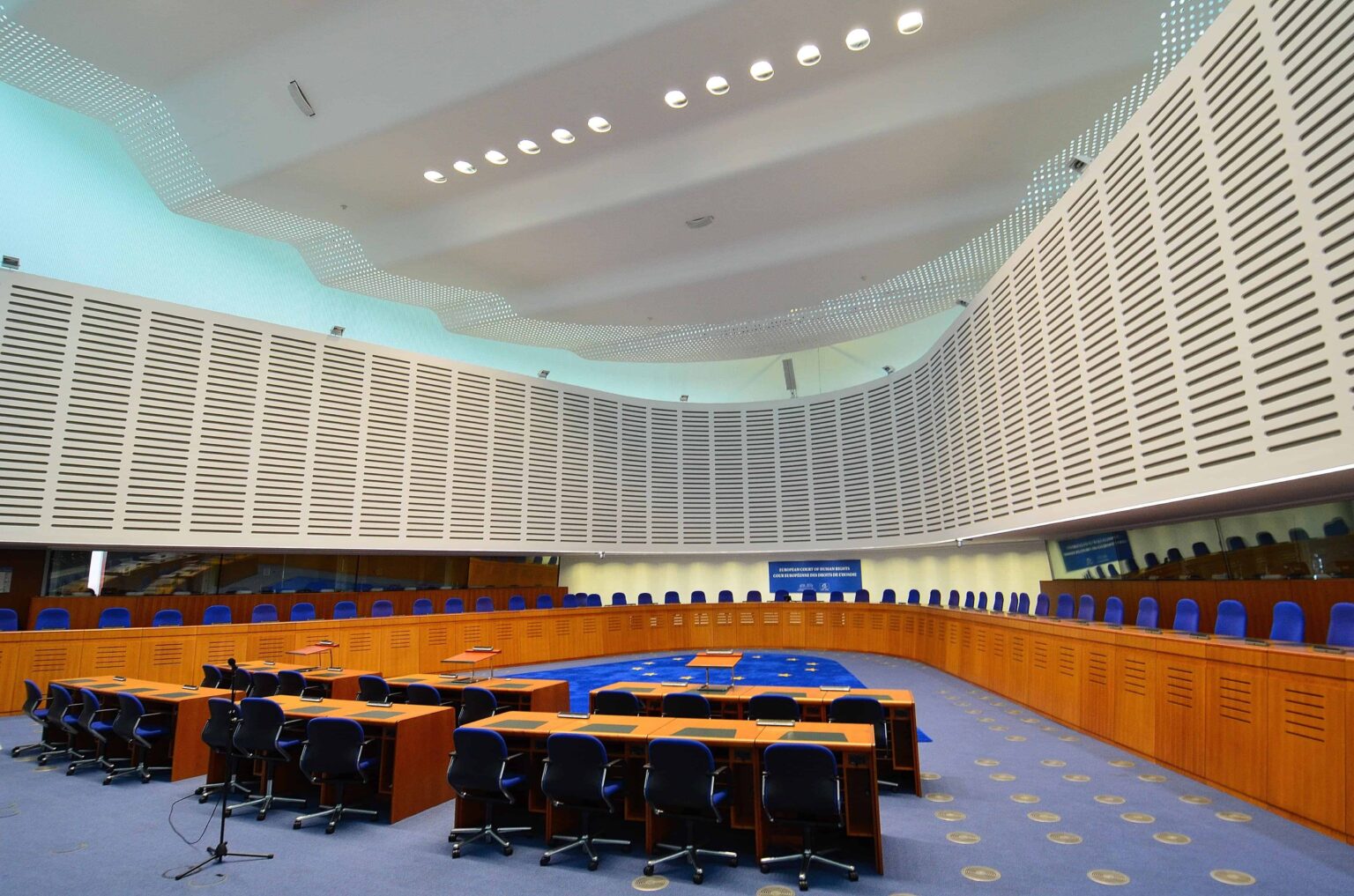Top European Court holds hearing on Polish refusal to recognise same-sex marriage certificate

Case could establish critical precedent for the freedom of movement of same-sex couples within the EU
Yesterday, the Court of Justice of the European Union (CJEU) held a hearing in the case of Wojewoda Mazowiecki (C-713/23) concerning the recognition by Polish authorities of a same-sex marriage certificate obtained in another EU Member State.
The hearing follows Poland’s refusal to transcribe into the civil registry a certificate of same-sex marriage contracted in Germany between a Polish citizen and a Polish-German citizen. The couple currently resides in Poland.
The Court is asked whether this refusal conforms with the provisions of the Treaty on the Functioning of the European Union (TFEU) and of Directive 2004/38/EC, which establishes the rights of EU citizens to move and reside freely within the EU, read in conjunction with the European Charter of Fundamental Rights (ECHR), particularly the right to respect for private and family life and the prohibition of discrimination.
The Court is asked to follow the reasoning adopted in the recent judgment in the Mirin case, which confirmed that freedom of movement and other fundamental rights guaranteed under the Charter require authorities to transcribe changes to gender markers and forenames obtained in another EU Member State into their civil registries. By requiring Member States to amend entries in the birth certificates of EU citizens, Mirin ensures that the legal framework for registering and amending citizens’ data is consistent across EU Member States.
This would be a significant step towards the protection of same-sex couples across the EU, especially in light of recent European Court of Human Rights judgments in Przybyszewska and Others v. Poland which found the Polish state in violation of Article 8 (right to respect for private and family life) of the ECHR for failing to provide a specific legal framework recognising and protecting same-sex unions, and in Formela v. Poland which found that Poland breached the same provision for failing to recognise the relationships of two same-sex Polish couples married abroad.
According to Senior Strategic Litigation Officer with ILGA-Europe, Marie-Hélène Ludwig: “A positive ruling in this case would go beyond what the Court found in the Coman and Pancharevo cases and build on the Mirin judgment to recognise that transcription of marriage in civil registries is the only way to effectively ensure freedom of movement of same-sex couples in the EU, notably in countries still deprived of any legal framework recognising their union. This is especially important as marital status – just like one’s gender identity and sexual orientation – is a fundamental aspect of a person’s identity and personal status.”
According to attorneys Pawel Knut and Artur Kula from KMA Law Firm, the lawyers representing the applicants in the case: “The positive outcome of this case of may ensure that the transcription of the foreign marriage certificates of same-sex couples will be finally required from those Member States that still do not provide any form of legal protection for same-sex couples. We believe that this would also strengthen an effective protection for the rights of LGBT families around the EU”.
The Advocate General’s Opinion in this case will be rendered on 3 April 2025.ILGA-Europe is providing support to the applicants and their lawyers in this case.
What European countries might soon start recognising non-binary people?

Interested in the current state of non-binary rights in Europe? This concise guide covers the most important updates and developments you should be aware of
Current situation
As of 2024, only a few European countries officially recognise non-binary gender markers. Iceland and Germany lead the way, allowing non-binary people to have their identities legally acknowledged. Denmark and Malta partially acknowledge non-binary identities, though issues remain, particularly in areas like the healthcare sector. You can read more about it in one of our previous blogs. However, progress is slow, and many countries still lack comprehensive legal frameworks for non-binary recognition.
Which countries are next?
France and the SNCF case: potential impact across the EU
Last Thursday (July 11, 2024) the Advocate General of the Court of Justice of the European Union (CJEU) gave his opinion that France’s national railway company SNCF should stop forcing passengers to choose between the civil titles “Mr” or “Ms” when purchasing train tickets. This landmark case, brought by Association Mousse, could set a precedent similar to the Deutsche Bahn case in Germany across the European Union.
In his opinion, which was published earlier this week, the Advocate General of the CJEU said that it is not “necessary” and that it is therefore unlawful for the SNCF to collect individuals’ civil titles. The Advocate General also agreed with Association Mousse that processing data on civil titles creates a risk of discrimination on the grounds of gender identity for trans and non-binary people notably as other States legally recognise non-binary identities.
Should the CJEU’s judgement align with the opinion of the Advocate General, all organisations collecting gender markers would be forced to stop doing so when it is not necessary for the service provided. The outcome has the potential to influence broader European standards for non-binary recognition, emphasising the role of strategic litigation in advancing rights.
Belgium’s legal hurdles
Belgium’s journey towards non-binary recognition has faced significant setbacks. In 2019, the Belgian Constitutional Court declared the existing laws discriminatory towards non-binary people. The government proposed removing gender markers from ID cards entirely, but this reform has stalled due to political and technical challenges. Despite these obstacles, there are plans to eventually implement these changes.
Italy on the verge of change
Italy is also nearing a significant decision. The Italian Constitutional Court is expected to rule on the inclusion of a third gender marker. This ruling could trigger legislative changes, inspiring other countries to follow suit and potentially transforming the landscape of non-binary rights in Europe.
Legal battles play a pivotal role in the fight for non-binary recognition. Cases like the ones in France and Germany highlight how litigation can drive change even when legislative processes are slow. These legal battles and proposed reforms are part of a broader movement toward inclusivity and respect for non-binary identities across Europe.
Beyond laws: the experience of being a non-binary person in EU
The third EU LGBTIQ survey report, published in June by the European Union Fundamental Rights Agency (FRA) offers some insights into non-binary lives. Almost 20% of respondents identified as non-binary, yet more than 90% do not have their identity legally recognised. When delving into the reasons behind this, it becomes evident that non-binary people face unique challenges and perspectives.
The reluctance or perceived lack of necessity for legal gender recognition (LGR) among non-binary people is often due to the accessibility and relevance of existing LGR frameworks. These frameworks typically do not include non-binary options, which discourages non-binary people from pursuing LGR.
For instance, while nearly 60% of trans women and men intend to seek legal gender recognition in the future, only 17% of non-binary respondents share this intention. This disparity suggests that non-binary people might not see current LGR options as applicable or beneficial to their identities, especially considering the potential discrimination they might face in the process.
Additionally, safety concerns significantly impact the daily lives of non-binary people. The FRA data revealed that 23% of non-binary people frequently hide their gender identity for safety reasons, a higher percentage compared to 10% of trans men and slightly more than trans women at 20%. This heightened sense of vulnerability underscores the pressing need for legal recognition and protection.
What do non-binary people want from the law?
Despite developments in Europe and farther afield, we still have relatively little data on what non-binary people want from the law and how they are currently experiencing different legal systems. This is something which ILGA-Europe, along with other civil society partners and a team of academics, will be looking to explore over the coming year. By understanding and addressing the specific challenges faced by non-binary people, we can better advocate for their rights and recognition across Europe.
Here is a list of useful resources for policy-makers and activists on the topic of non-binary rights:
- Rainbow Map: Legal gender recognition
- Human Rights and Gender Identity and Expression: Issue Paper by the Council of Europe Commissioner for Human Rights
- Non-binary gender registration models in Europe: Report on third gender marker or no gender marker options by Lena Holzer for ILGA-Europe
- Intersections – Diving into the FRA LGBT II Survey data: Trans and non-binary briefing by ILGA-Europe and TGEU
Joint Letter: Germany urgently needs to finally allow EU to continue closing gaps on anti-discrimination with racism, xenophobia, LGBTI-phobia and sexism on the rise

The following open letter has been jointly sent to the German government by ILGA-Europe, the European Network Against Racism, European Disability Forum and Age Platform Europe.
Dear Chancellor Scholz,
We are writing to you today as a coalition of European NGO networks working on equality and non-discrimination, representing thousands of organisations of LGBTI people, people with disabilities, racialised people, the young and older people. Together with many other human rights organisations we are very concerned that while a large majority of EU Member States supported the efforts of the Belgian Presidency to finally ensure that the EU’s draft Equal Treatment Directive (2008/0140(CNS)) gets adopted after 14 years of stalling in the Council, it was yet again your government that blocked any progress by not lifting the general reservation.
Considering your strong commitment to advancing equal rights, as well as a clear passage in the coalition agreement that commits to supporting the broadening of anti-discrimination legislation on EU level to include LGBTI people (Überschrift Queeres Leben S.95 des Koalitionsvertrags: „Rechtsakte der EU, die gegen Diskriminierung aufgrund von Rassismus gelten, müssen künftig auch Homophobie und andere Diskriminierung umfasse“), the ongoing general reservation of your Government is cause for concern. Lifting your Government’s blockage would also be an important step to protect older persons from discrimination, another commitment made in the coalition agreement (Überschrift Senioren: “Wir werden ältere Menschen vor Diskriminierung und vor finanzieller Ausbeutung– insb. durch Vorsorgevollmachten – schützen“).
This directive, which represents one step towards more equality, has not reached agreement in the Council for 14 years now. One major blocking stone of any negotiation between Member States has been the general reservation of Germany. In 2024, people living in the EU, especially those at the intersections of inequalities are still not equally protected by law when they experience discrimination in all spheres of life because of their age, gender/sex, belief or religion, sexual orientation, disability, race or ethnic origin. For the moment, across the EU, there is a patchwork of unequal protection, with negative consequences for individuals, businesses and Member States themselves. At a time when acts of racism, xenophobia, LGBTI-phobia and sexism are on the rise across the EU, this absence of legislative action towards more equality by EU Member States is highly problematic.
What is more, the results of the European elections on 9th June 2024, have shown quite clearly that in many EU Member States the far-right is on the rise and upcoming national elections might further shift the majorities in the Council. Laws and policies are too often the last line of defence for minorities in our societies. In a social and political context which is increasingly polarised and makes them particularly vulnerable this is further exacerbated. However, there still is a window of opportunity now to finally adopt the Equal Treatment Directive which might close very soon if the governments of more Member States shift to the right.
Amid a surge in far-right political parties gaining seats in the new European Parliament, with gains also at national level expected, the new compositions of the European Parliament and Council will have serious consequences on EU decision making. This is a critical time for the EU and its Member States to fulfil their obligations to ensure that better protection against discrimination in all areas of live is put down in law on EU level, adding to the protection of EU fundamental rights.
For over a decade now, people across the EU hear again and again that Germany could not lift its general reservation due to disagreements in the government. Your Government has clearly committed to furthering equality and non-discrimination in Germany, at the EU level and the United Nations. After the elections in Poland, the Polish Government has changed its position on the directive, and made a very clear statement in the EPSCO on the 20 June that they want to adopt the directive as soon as possible, as did many other Member States. In the final weeks of the Belgian Presidency, the German Government has a unique opportunity to put the commitment of its coalition agreement finally into action.
We therefore urge your Government to lift the general reservation as soon as possible.
Yours sincerely,
ILGA-Europe
European Network Against Racism
European Disability Forum Age Platform Europe
Our submission to the EC 2023 Rule of Law report

The submission covers developments in eight EU Member States as regards rule of law developments in the countries which have had an impact on the fundamental rights of LGBTI people and their democratic participation, with a focus on the past year (2022).
We have kept our inputs relevant to the content asked for by the consultation, and therefore we have not included all fundamental rights violations against LGBTI people, or all restrictions experienced by LGBTI civil society in the respective countries. We have only included them where there is a clear link to the issues of rule of law contained in the consultation.
Notably the submission covers the following topics:
- Manipulation of judicial processes to attempt to erode the human rights of LGBTI people and their access to justice;
- Politicians attempting to discredit and delegitimise the rulings of courts that uphold the rights of LGBTI people;
- Harassment and intimidation of LGBTI human rights defenders by law enforcement/prosecution services;
- Smear campaigns and negative narratives against LGBTI people, particularly where independence of media is threatened;
- SLAPPs against activists or journalists reporting on topics of public interest related to LGBTI;
- Censorship of LGBTI content;
- Tabling and adoption of laws aiming to reduce fundamental rights of LGBTI people;
- Tabling of laws aimed at restricting the functioning of civil society organistions;
- Arbitrary application of Covid-19 regulations to attempt to restrict the freedom of assembly of LGBTI people;
- Continued non-implementation of CJEU or ECtHR judgements which would improve the lives of LGBTI people;
- Anti-LGBTI discriminatory speech from political and religious leaders affecting public perception of LGBTI CSOs and creating an unsafe climate for LGBTI human rights defenders;
- Insufficient implementation of legal protection (e.g. protection against hate crime) for LGBTI people by responsible services, sometimes including Ombudspersons.
A.H. and Others v Germany

Recognition of trans parenthood.
Submitted jointly by ILGA-Europe, TGEU, and Bundesverband Trans*.
Find here the communicated case.
The Court made its decision on 4 April 2023, which found that it is within the State’s discretion to list a trans parent on their child’s birth certificate using a “deadname” and sex assigned at birth.
O.H. and G.H. against Germany

Legal gender recognition
(Apps. nos. 53568/18 and 54741/18), 25 June 2019
Find here the communicated case.
- The case concerns a transgender man who gave birth and applied to be registered as father to his child. The German authorities refused his request and registered him instead as mother under his former female forename.
- ILGA-Europe together with TGEU submitted the following:
- Restrictive LGR procedures hinder the ability of trans people to enjoy their family life. The law is often not adapted to their situations, as trans parents are frequently forced to disclose their trans identity because of a mismatch between public records and the children’s birth certificate.
- In 2018, the Parliamentary Assembly adopted a resolution asking States to provide for transgender parents’ gender identity to be correctly recorded on their children’s birth certificates. The Yogyakarta Principles specify that “States shall issue birth certificates for children upon birth that reflect the self-defined gender identity of the parents.”
- In Germany, the state de facto dictates a single possible parenting structure, enforces gender norms (a pregnant person is always a mother) and erases the lived reality of other possibilities. Consequently, birth certificates are often contradictory to the reality, forcing trans parents to reveal their trans identity, thus leading to frequent discriminatory and degrading treatments against trans parents and their children in their daily life.
- The Court made its decision on 4 April 2023, which found that it is within the State’s discretion to list a trans parent on their child’s birth certificate using a “deadname” and sex assigned at birth.
A missed opportunity to recognise self-determination in Germany

On 15 August, the Federal Government of germany adopted a draft bill on a third gender option. This bill is a missed opportunity to recognise the right to self-determination of trans, intersex and all gender-diverse people.
German legislators were requested by the Constitutional Court, following its decision of October 2017, to amend the law on gender registration. The Court provided two possible scenarios: either the Government introduces a “third” non-binary legal gender category or it abolishes the registration of gender altogether. The mandate for drafting the German personal status law amendment lies with the Ministry of Interior, currently led by Horst Seehofer, who is one of the leadings politicians of the conservative party Christian Social Union in Bavaria (CSU).
In June, an early draft of the law was sent to main organizations working on trans and inter issues in order to receive a statement about the draft by July. The two main worrying elements were that the introduction of a “third” gender category was limited to people who present a medical certificate confirming “Differences of Sexual Development“ and that this new gender category would be named “weiteres”, which translates into “other” in English. The draft released on 15 August has improved at least on one of those two points, as it now refers to “diverse” for the name of this new category instead of “other”. However, the third gender category is still only reserved for a specific group of intersex people who can provide a specific medical certificate on “Differences of Sexual Development“.
It means that we are still very far from the introduction of a non-binary legal gender category open for all non-binary persons on the basis of self-determination, which is what the German institute of Human Rights had proposed after consulting trans and intersex groups. We’re also very far from the spirit of the Constitutional Court decision, which explicitly declares that the German Constitution protects the fundamental rights of persons identifying neither female nor male.
The law must now be adopted by the Bundestag and the Bundesrat before entering into force. We call on the Members of the Parliament to amend this draft bill so that it fully respects the fundamental rights of people who would like to make use of this law. We also call on the Government to as soon as possible prohibit unnecessary medical treatments on intersex children and to propose a revision of the current law on legal gender recognition, to bring it in line with the current human rights standards.
Bring on 2018 – reaction to German Constitutional Court decision on gender markers
Warning: Trying to access array offset on value of type bool in /home/igerkbsl22/public_html/files/themes/ilgaeurope/inc/components/embed-videos.php on line 55
Warning: Trying to access array offset on value of type null in /home/igerkbsl22/public_html/files/themes/ilgaeurope/inc/components/embed-videos.php on line 55
The German Constitutional Court decision is ground-breaking.
It’s putting the conversation about recognition of intersex and non-binary people front and centre in a very positive way.
German policymakers now have two options: introduce a third gender option for people who do not identify as a man or a woman, or remove gender registration altogether.
Either way, the official recognition of people outside the gender binary is coming to Germany! Yesterday, the court imposed a deadline that has to be met by legislators, so we know things will change by the end of 2018.
The court ruling recognises the wonderful diversity in our LGBTI movement. There are people who identify as male or female or non-binary. By opening up the options on birth certificates (or even removing the need to note down gender markers on such documents in the first place) it acknowledges the existence of intersex and non-binary people in our societies.
Already in 2013, Germany introduced changes to gender registration. For babies that at birth were identified as intersex, with variations in sex characteristics that don’t fit medical norms for female or male bodies, the gender marker was left blank. However well intended, this blank led to increased stigmatisation of intersex people and raised the pressure on parents to agree to sex-conforming surgeries to make their child fit a male or female gender marker.
ILGA-Europe are very pleased to hear it stated so publicly that more than two gender and sexes exist. We hope that the voices of many, many intersex and non-binary activists will be heard and listened to during the legislative process – as Hanne Gaby Odiele said at our Gala this year, intersex people are part of society and need recognition and respect!
- For more detailed information, read the joint statement from OII Europe, IVIM-OII Germany, TGEU and the German Trans* Association (Bundesvereinigung Trans*).
Hanne Gaby Odiele at European Equality Gala 2017 from ILGA-Europe on Vimeo.